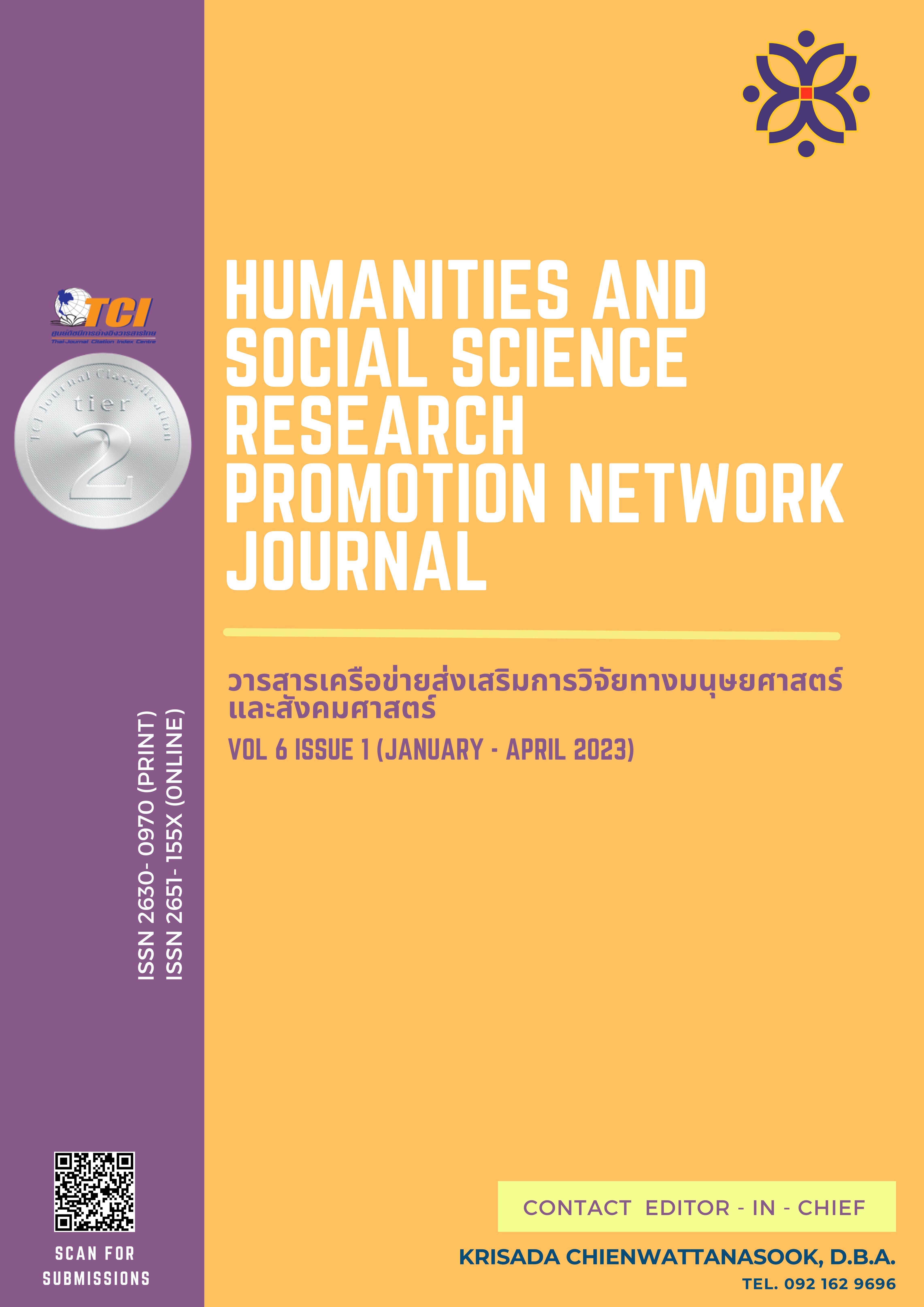ผลกระทบเชิงสาเหตุของการรับรู้วัฒนธรรมองค์กรต่อความผูกพันของพนักงาน: หลักฐานเชิงประจักษ์จากอุตสาหกรรมการผลิตอุปกรณ์อิเล็กทรอนิกส์
คำสำคัญ:
ผลกระทบเชิงสาเหตุ , การรับรู้วัฒนธรรมองค์กร , ความผูกพันต่อองค์กรบทคัดย่อ
การวิจัยนี้มีวัตถุประสงค์เพื่อศึกษาผลกระทบเชิงสาเหตุของการรับรู้วัฒนธรรมองค์กรต่อความผูกพันของพนักงานบริษัทแห่งหนึ่งในอุตสาหกรรมการผลิตอุปกรณ์อิเล็กทรอนิกส์ กลุ่มตัวอย่างที่ใช้ในการวิจัยนี้ คือ พนักงานบริษัทแห่งหนึ่งในอุตสาหกรรมการผลิตอุปกรณ์อิเล็กทรอนิกส์ ที่ตั้งอยู่ในพื้นที่ภาคกลาง จำนวน 300 คน สุ่มตัวอย่างแบบตามสะดวก โดยใช้แบบสอบถามเป็นเครื่องมือในการเก็บรวบรวมข้อมูล วิเคราะห์ข้อมูลด้วย ค่าความถี่ ร้อยละ ค่าเฉลี่ย ส่วนเบี่ยงเบนมาตรฐาน และทดสอบสมมติฐานด้วยแบบจำลองสมการโครงสร้างกำลังสองน้อยที่สุดบางส่วน
ผลการวิจัยพบว่า การรับรู้วัฒนธรรมองค์กร ได้แก่ วัฒนธรรมที่มุ่งเน้นงาน วัฒนธรรมที่มุ่งเน้นบุคคล และวัฒนธรรมที่มุ่งเน้นทีมงาน มีอิทธิพลทางบวกต่อความผูกพันของพนักงานบริษัทแห่งหนึ่งในอุตสาหกรรมการผลิตอุปกรณ์อิเล็กทรอนิกส์ อย่างมีนัยสำคัญทางสถิติที่ระดับ 0.000 ซึ่งทั้ง 3 ตัวแปรร่วมกันทำนายได้ร้อยละ 71.4 โดยข้อค้นพบนี้ชี้ให้เห็นว่าการรับรู้วัฒนธรรมองค์กรทั้งสามเป็นองค์ประกอบที่สำคัญในการขับเคลื่อนองค์กรและยึดโยงความรู้สึกผูกพันต่อองค์กรของพนักงาน โดยเฉพาะในระบบงานแบบอุตสาหกรรมการผลิตอุปกรณ์อิเล็กทรอนิกส์ที่มุ่งเน้นการทำงานที่บรรลุผลสำเร็จตามคำสั่งซื้อหรือความต้องการสำรองสินค้า เนื่องจาก สินค้าค้าดังกล่าวเป็นสินค้าที่เป็นที่ต้องการของตลาด ณ ปัจจุบัน ดังนั้นการที่มีวัฒนธรรมที่มุ่งเน้นงานไม่เพียงพอต่อการที่จะทำให้พนักงานผูกพันต่อองค์กร แต่จะต้องสร้างวัฒนธรรมที่สนับสนุนไปยังตัวบุคคลและการทำงานแบบทีมควบคู่ไปด้วยจึงจะประสบความสำเร็จในการบริหารทรัพยากรมนุษย์ที่เป็นกำลังการผลิตที่สำคัญขององค์กร
เอกสารอ้างอิง
Akbar, A., Ahmad, M. S., Chohan, M. A., & Hussain, M. (2019). Impact of organizational culture on employee engagement: Evidence from banking sector. Pakistan Journal of Commerce and Social Sciences, 13(2), 399-417.
Albrecht, S. L., Bakker, A. B., Gruman, J. A., Macey, W. H., & Saks, A. M. (2015). Employee engagement, human resource management practices and competitive advantage: An integrated approach. Journal of Organizational Effectiveness: People and Performance, 2(1), 7-35.
Ashkanasy, N. M., Wilderom, C. P. M., & Peterson, M. F. (2012). Handbook of organizational culture and climate. Sage Publications.
Bakker, A. B., & Demerouti, E. (2014). Job demands-resources theory. Wellbeing: A Complete Reference Guide, Work and Wellbeing, 1-28.
Bakker, A. B., & Leiter, M. P. (2010). Work engagement: A handbook of essential theory and research. Psychology Press.
Chatman, J. A., & Barsade, S. G. (2012). Understanding the role of culture and climate in organizations. In Handbook of psychology, Volume 12: Industrial and organizational psychology (2nd ed., pp. 564-593). John Wiley & Sons.
Chen, G., Zhao, Y., & Zhang, J. (2018). The relationship between performance orientation culture, work engagement, and job crafting: A moderation model. Social Behavior and Personality: An international journal, 46(4), 573-584.
Denison, D. R., Hooijberg, R., & Lane, N. (2019). Organizational culture and leadership. John Wiley & Sons.
Fornell, C., & Larcker, D. F. (1981). Evaluating structural equation models with unobservable variables and measurement error. Journal of marketing research, 18(1), 39-50.
Guillaume, Y. R., Brodbeck, F. C., & Riketta, M. (2012). Perception of organizational culture and its impact on diversity openness. Journal of Applied Social Psychology, 42(3), 538-565.
Haar, J. M., Roche, M. A., & Luthans, F. (2018). The role of positive psychological capital and employee engagement in facilitating a positive employee-organization relationship. Journal of Occupational Health Psychology, 23(1), 64-73.
Hair, J. F., Black, W. C., Babin, B. J., & Anderson, R. E. (2010). Multivariate data analysis: A global perspective (7th ed.). Pearson.
Henseler, J., Hubona, G., & Ray, P. A. (2016). Using PLS path modeling in new technology research: updated guidelines. Industrial Management & Data Systems, 116(1), 2-20.
Jaiswal, N. K., & Dhar, R. L. (2018). Role of organizational culture, employee engagement and perceived organizational support in employee retention. Management Research Review, 41(6), 662-682.
Jha, S. K., & Jha, M. K. (2019). Impact of organizational culture on employee behavior. Journal of Business and Finance Management Research, 1(1), 1-12.
Kamminga, P., & Roodt, G. (2017). Engaged employees: Staying or leaving? The link between job resources, affective commitment, and voluntary turnover. South African Journal of Human Resource Management, 15, a834.
Khampha, S., & Boonjing, V. (2019). Organizational culture and employee engagement in the electronics manufacturing industry in Thailand. Kasetsart Journal of Social Sciences, 40(1), 55-60.
Lee, Y., You, Y., Kim, M., & Lee, S. (2019). Effects of leadership, organizational culture, and task complexity on employee engagement. Sustainability, 11(23), 6733.
Lin, H.-J., & Huang, T.-C. (2020). The impact of organizational culture on work orientation: A study of employees in Taiwan. Journal of Management & Organization, 26(4), 532-548.
Mahrous, A. A., & Darwish, T. K. (2018). Impact of organizational culture on employee engagement: An empirical study. Journal of Management Development, 37(1), 6-17.
Mauno, S., Ruokolainen, M., & Kinnunen, U. (2017). Does high employee well-being relate to high customer satisfaction? A study of retail personnel. Journal of Occupational Health Psychology, 22(1), 15-25.
Meyer, J. P., & Allen, N. J. (1990). The measurement and antecedents of affective, continuance and normative commitment to the organization. Journal of Occupational Psychology, 63(1), 1-18.
Rich, B. L., Lepine, J. A., & Crawford, E. R. (2010). Job engagement: Antecedents and effects on job performance. Academy of Management Journal, 53(3), 617-635.
Saks, A. M. (2015). Antecedents and consequences of employee engagement revisited. Journal of Organizational Effectiveness: People and Performance, 2(1), 1-19.
Saks, A. M., & Gruman, J. A. (2014). What do we really know about employee engagement? Human Resource Development Quarterly, 25(2), 155-182.
Sarwar, A., Abbas, M., Tariq, H., & Sajjad, S. (2018). Organizational culture and employee engagement: A review paper. Journal of Business and Tourism Research, 13(1), 32-39.
Schein, E. H. (2017). Organizational culture and leadership (5th ed.). San Francisco, CA: Jossey-Bass.
Shantz, A. D., Alfes, K., Truss, C., & Soane, E. C. (2013). The role of employee engagement in the relationship between job design and task performance, citizenship and deviant behaviours. International Journal of Human Resource Management, 24(13), 2608-2627.
Shuck, B., & Reio Jr, T. G. (2014). Employee engagement and well-being: A moderation model and implications for practice. Journal of Leadership & Organizational Studies, 21(1), 43-58.
Siriviriyakul, P., & Chuttipattana, N. (2018). Employee engagement and organizational citizenship behavior: The mediating role of affective commitment in a Thai private hospital. Journal of Health Research, 32(1), 52-61.
Wang, J., Wu, J., & Chen, X. (2019). Organizational culture and team-oriented behavior: The mediating role of organizational identification. Frontiers in Psychology, 10, 1537.
Xu, X., Liu, Z., & Wang, X. (2020). Organizational culture perception and individual orientation: A mediated moderation model. Frontiers in Psychology, 11, 1344.
Yıldız, S., & Deniz, A. (2015). The effect of organizational culture on organizational commitment: The mediating role of value systems. Procedia-Social and Behavioral Sciences, 195, 1970-1976.
Yoon, J., & Thye, S. R. (2019). Organizational culture and employee engagement: A multilevel analysis. Social Science Research, 77, 69-81.
ดาวน์โหลด
เผยแพร่แล้ว
รูปแบบการอ้างอิง
ฉบับ
ประเภทบทความ
สัญญาอนุญาต
ลิขสิทธิ์ (c) 2023 พัชร์หทัย จารุทวีผลนุกูล, ภัทรี ฟรีสตัด

อนุญาตภายใต้เงื่อนไข Creative Commons Attribution-NonCommercial-NoDerivatives 4.0 International License.
บทความที่ได้รับการตีพิมพ์เป็นลิขสิทธิ์ของ ผู้เขียน
ทัศนะและความคิดเห็นที่ปรากฏในบทความในวารสารเครือข่ายส่งเสริมการวิจัยทางมนุษยศาสตร์และสังคมศาสตร์จะถือเป็นความรับผิดชอบของผู้เขียนบทความนั้น และไม่ถือเป็นทัศนะและความรับผิดชอบของกองบรรณาธิการ








